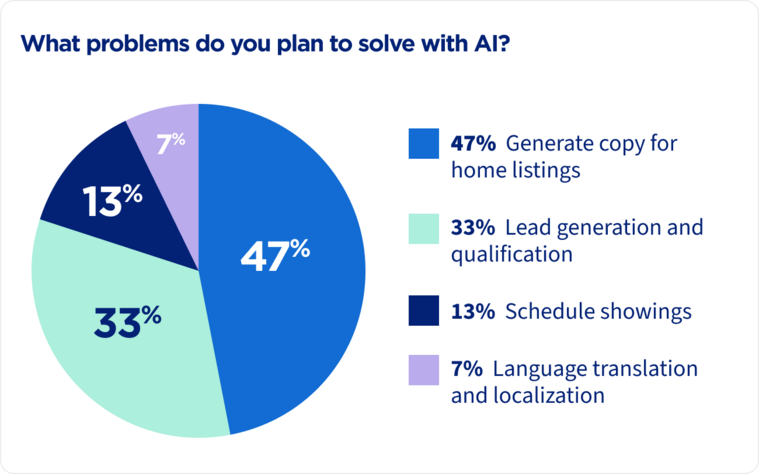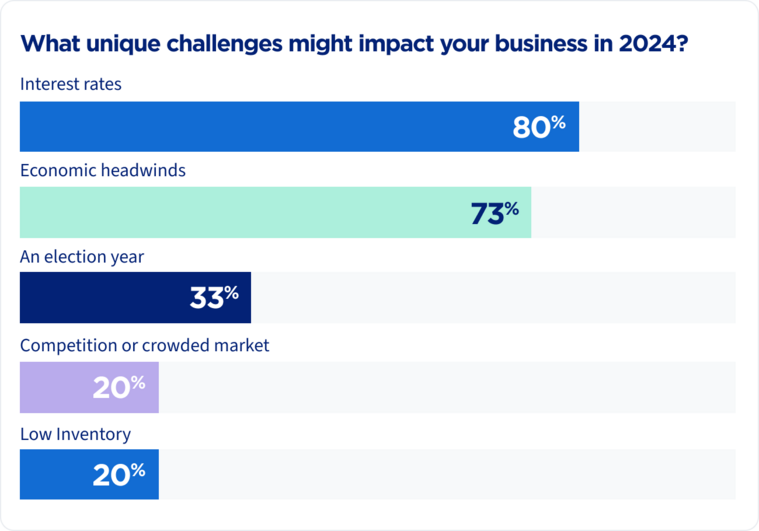Trend #1: The industry is embracing the power of AI for lead generation and operations
by:CallRail January 11, 2024
The real estate industry has historically been behind the curve when it comes to new technology solutions, but according to All Points Digital, is this seems to be changing. “A lot of companies are more open to looking for new technology solutions than in the past as a way to stay ahead rather than tread water, which is a bit different than it’s been,” says Jason.
RealtyHive also agrees that to remain competitive, real estate firms must embrace new technologies and innovate more. In their firm, they’ve created an app, Cashifyd. The app, currently available in 40 states, connects US home buyers and sellers with real estate agents who offer cashback and savings.
“It will get them [agents] more attention and more buyers…and that’s the kind of thing as an agent that you have to go out and find, try, and do – whether it’s an app or something else that is going to make you stand out to the buying public,” says Wade.

Trend #2: Interest rates, low inventory, and an election year will make 2024 uniquely challenging
While the real estate industry is leaning into marketing and technology to help generate more leads and business, there are several significant challenges it must address. According to survey respondents, the changes that will most impact business in 2024 are interest rates (80%), economic headwinds (73%), and the fact that it’s an election year (33%). A fifth also said that competition/crowded market and low inventory will be challenges in the year ahead.
Part of the challenge with interest rates, and why it’s ranked so high, is what RealtyHive calls the “lock-in effect.” Wade notes that with approximately 65% to 70% of people currently with a mortgage locked in under 4%, it’s very difficult for those people to justify moving unless they have to. “So this lock-in effect is likely to drag on until either interest rates decrease or there’s an influx of new inventory, possibly through foreclosures or increased construction,” says Wade.
There is also a higher cost to buyers. As interest rates have risen from 3% to 8%, it translates into a substantial increase in monthly mortgage payments. According to RealtyHive, this jump in rates has effectively taken roughly five million potential buyers from the market, which is nearly the entire population of Wisconsin. The end result is more buyers competing with more people at a lower price point.

Trend #3: SEO and social will get the most budget, while text is the tactic to test in 2024
When asked about how they plan to prioritize their marketing budget in 2024, real estate companies listed website and SEO as the top channels. Social media and email marketing came in second and third, respectively. This further cements the importance of real estate firms having an online presence and increasing visibility across all digital channels.
Less important are non-digital strategies like events, which was ranked fourth, and print marketing, which came in fifth. Even though print marketing was given the lowest priority, the majority (60%) still say they will invest in it, highlighting that traditional channels like direct mail and print ads still matter in the industry – just not quite as much as they once did.

In addition to prioritizing the channels listed, many real estate marketers are interested in testing new tactics, especially mass text marketing and single opt-in (SOI). With SMS open and response rates at 98% and 45%, respectively compared to 20% and 6% for email, text marketing holds real potential for realtors – and the use of SOI makes it easier to get consent for both text and email. Real estate professionals surveyed also said they were interested in testing AI more, especially for automating text messages.
While sticking with tried and true channels and testing new ones is a solid strategy, one area where the real estate industry has traditionally fallen short is in having the data to back up their choices. But that may be changing, according to All Points Digital.
“One trend we saw through last year with our clients is an increased focus on understanding where my traffic’s coming from,” notes Jason. “Often, they say it just came from my website, but they’re starting to understand attribution a little bit better because of how expensive online marketing is becoming. They’re starting to demand better insight into where the dollars are going.”
Trend #4: Social media will be the top lead generation tactic in 2024
While real estate marketers may be planning to allocate more budget to their website and SEO, the number one lead generation tactic they plan to deploy in 2024 is social media (87%), followed by website and SEO (73%), and email marketing (73%).

These results highlight the recognition within the industry that platforms like Facebook, Instagram, and LinkedIn are powerful tools for reaching and engaging potential leads, while websites, SEO, and email marketing still remain reliable and important channels for lead generation.
However, there continues to be a need within the industry to better understand which lead generation channels and tactics work best. RealtyHive invested in Call Tracking to help answer this question – and it’s allowed them to spend their lead generation dollars much more effectively.
“One of the most expensive things is advertising, and one of the key things with advertising is to know what works and doesn’t work. If you’re running three, four, five, or six, or in our case, 10 or 20 different things, it’s pretty important to understand what actually works and what doesn’t work.” – Wade Micoley, Founder, RealtyHive
For instance, before Call Tracking, RealtyHive was running print ads in a lot of big-name newspapers. Even though the readership was within the millions, it was expensive, and they didn’t know if it was working. Thanks to Call Tracking, what they found was it wasn’t working – and they were then able to allocate that budget to what they knew was working.
In addition, by utilizing CallRail’s keyword pools for their website, RealtyHive can now get more granular about how people find their website. They can see what digital advertising visitors were shown that pushed them to the website, so even if website visitors don’t submit a form or answer the question, “How did you find us?” RealtyHive can still track what keywords, ads or social media channels are driving visitors to the website.
Trend #5: The industry will get more competitive in 2024
With interest rates and economic headwinds presenting significant challenges in 2024, firms that want to thrive rather than just survive must get more strategic in their deployment of data and understanding lead gen sources, as well as pursue greater innovation and uniqueness in the marketplace.
“Because of the economy and everything getting tighter,” says Jason Mazur. “They’re now forced to look at what’s actually producing rather than sticking the finger in the air and guessing and going back to what they’ve been doing for the last 20 years.”
All Points Digital emphasizes the importance of being able to understand the data and show a return on investment. “We win by showing them [our clients] the data, proving we can track where their money goes and demonstrate the actual return on investment,” says Jason.
One way All Points Digital does this is by tapping into operational data from phone calls, which he sees as an emerging opportunity in the industry. “What has not become a trend but is a bigger opportunity overall is understanding that there is a lot of operational data in the phone call,” says Jamie, noting that transcripts of phone calls have a lot of information embedded in them that can be unlocked in a way that simply was not possible prior to 12 months or so ago.
Better understanding the source of leads is also critical to remaining competitive and doing more with less in the current economic climate. Jamie at All Points Digital notes that within the property management world, all the big property management companies handle incoming leads by putting all leads into one bucket called property website, so it looks like all the leases or leads come in from the property website, but they have no understanding of how people got to the website, which means they don’t have any real understanding of their marketing budget.
Finally, real estate firms must not only get better at understanding what marketing is effective but also innovate and find ways to stand out against the competition. Wade notes that the days of just being an agent and saying, “I have a license. I’m a really nice person. I do a good job,” is now table stakes, and realtors must go beyond that to get people to pay attention to you.
“The people that stand out in times like these, that actually don’t just survive, but do really well,” says Wade, are those that innovate. “Because they change the game. And changing the game will get you attention, and attention will get you more clients.”